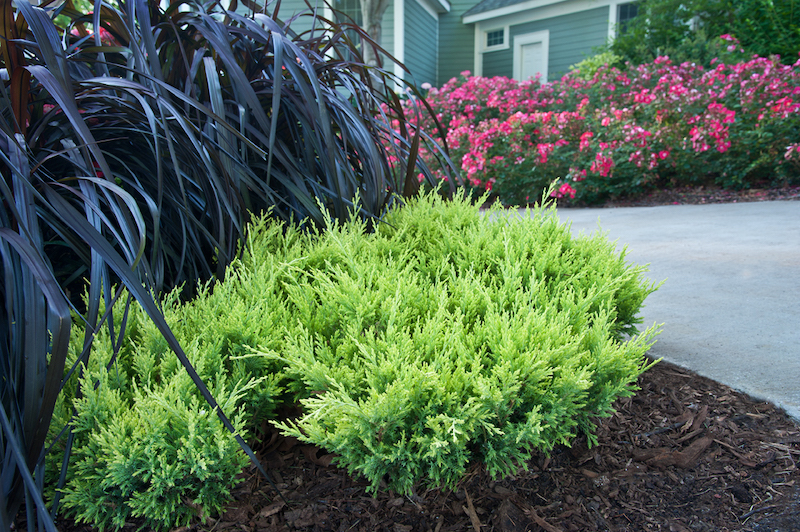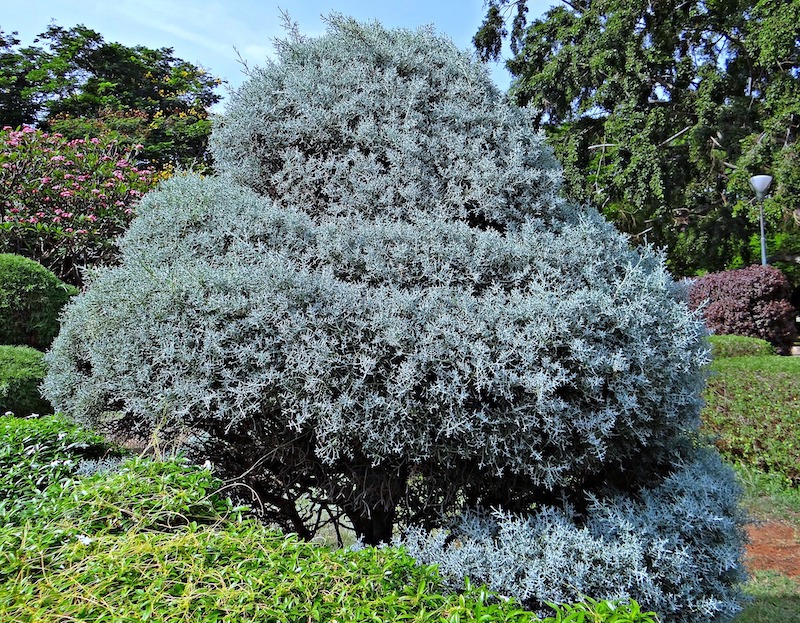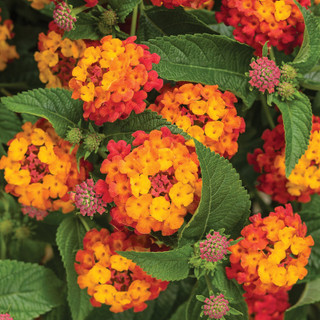Juniper is an evergreen shrub that is available in many different sizes, shapes, and colors. No matter if you have a low-growing Juniper planted as a ground cover or a vertical Juniper grown as a specimen, there is a wide range of plants that will combine perfectly to create a delightful and easy-to-care-for landscape.
All Junipers are hardy and able to grow well in full sun or part shade. Provided the soil is well-drained, Junipers are not overly fussy about the pH or composition of their soil. Slightly acidic to neutral or even slightly alkaline soil will work for growing healthy shrubs. Juniper is a tough plant, able to withstand high heat in most growing zones and dry or poor soil conditions for long periods.

Juniper can be used in a variety of settings, including Asian-inspired zen gardens, woodland gardens, coastal, and urban garden designs. All will showcase this tough and dependable shrub’s strengths. Look for companions that have the same characteristics as Juniper to create landscapes that require little maintenance or care during the year. Junipers can also be used as a sort of sheltering or nurse shrub for more vulnerable plants along driveways or sidewalks, or to deter deer and rabbits from coming into the garden.
Shrubs To Plant With Juniper
Juniper can be paired with almost any shrub, no matter if it is deciduous or evergreen. Combining evergreen shrubs on a difficult slope or in a remote area of a large yard can make seasonal maintenance very low. Juniper, barberry, yucca, heather, and rosemary will provide year-round interest in even the most difficult-to-access garden beds.
Junipers can also have a more refined look when planted as a low-growing hedge near deciduous and flowering shrubs. Rose of Sharon, Abelia, Hydrangea, and shrub roses may develop bare stems that can be easily hidden with the free-form shapes of low-growing Juniper, with little pruning needed. This low-growing layer of plants is often referred to as facer plants and is very effective in keeping the garden looking full and lush even after the main blooming period has ended.

Perennials To Plant With Juniper
The long-lasting foliage color and varied forms of Juniper make them a great backdrop for a wide range of herbaceous perennials and bulbs. Early in the spring, plant bulbs such as crocus, daffodils, tulips, and English bluebells as a low-growing carpet for upright Junipers. Creeping Phlox, Nepeta, and smaller ornamental grasses are effective either as ground covers or a border in front of Junipers. Euphorbia, Agapanthus, Echinacea, Russian Sage, and Clematis all grow well in the same conditions Juniper prefers, with little extra irrigation needed once the plants are fully established. Plant Hellebores, Japanese Anemone, blueberry, and rose shrubs to provide late fall foliage color and early winter flowers.
Annuals To Plant With Juniper
Annuals can be planted to highlight subtle color variations in Junipers during the early spring and provide long-lasting flowers well into the fall. Once nighttime temperatures reach 40 degrees Fahrenheit, plant Pansies, Violas, Calendulas, or Petunias for a shot of color early in the spring. Heat-loving annuals such as Zinnias, Verbena, Lantana, and Wax Begonias will continue a colorful display during the hottest part of summer, only needing to be removed after the first frost in fall.

Best Companion Plants For Juniper in Containers
For container gardens, the dwarf varieties of Juniper are recommended. The compact and slow-growing habit of dwarf Junipers lend themselves to annual clipping into bonsai or topiary, while being able to grow for many years in the same planter. Plants with shallow roots such as most annuals and low-growing sedums or Echeveria could be used in a planter as living mulch, helping to cool the soil and provide a little bit of seasonal color at the same time. Portulaca, creeping jenny, petunias, or classic variegated English ivy all look great paired with Juniper and can be changed at the discretion of the gardener.
Plants Not To Grow With Junipers
Spreading Junipers are great for stabilizing sloped gardens or providing a carpet of durable color and cover to hot and dry locations. The only plants that do not grow well with Junipers are aggressive self-seeders. Cosmos, Nigella, any type of poppy, and rose campion can seed aggressively, depositing their seeds in places around Junipers that may be hard to weed. Plants that prefer boggy conditions like elephant’s ear, Japanese iris, rush, and blue flag also do not pair well with Juniper.
Best Plants To Grow With Juniper
The best pairings with Junipers include low-maintenance plants with colorful flowers or foliage. Try combining purple fountain grass, Juniper, and shrub roses for a summer-long display of color and texture in your garden. You can also try combining Junipers with different colors, habits and textures for an easy, minimalist design with year round interest. For a stunning contrast of foliage and color, pair juniper with agapanthus, clematis, and verbena. The different heights of the plants will add layers of interest.
 |
Author Robbin Small - Published 9-07-2023 |






